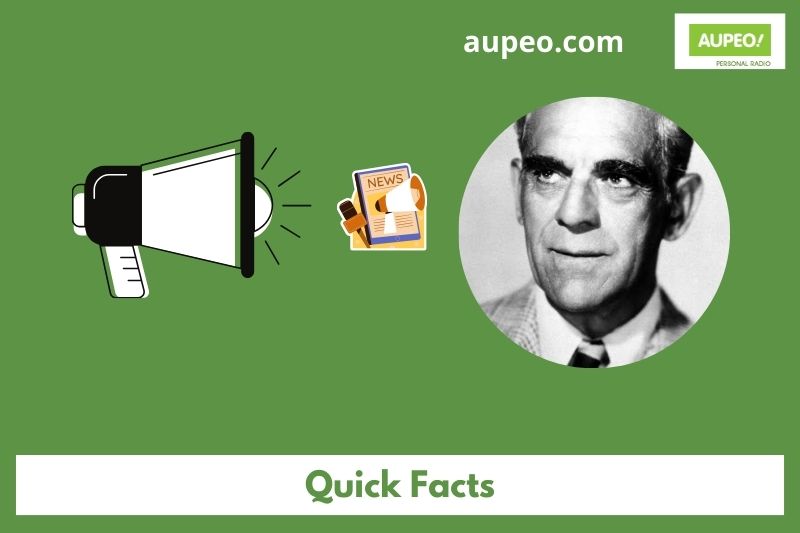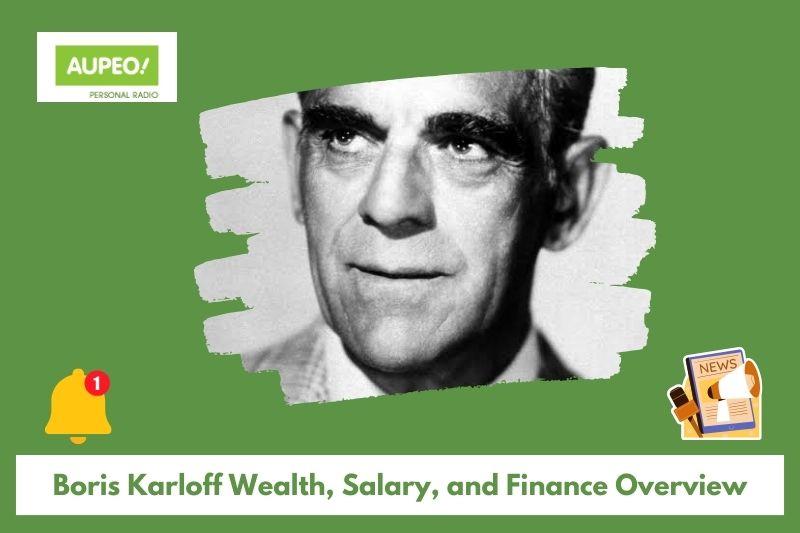
Boris Carloff remains a legendary figure in Hollywood, most famous of the iconestic character of Frankenstein and imhotep.
But beyond his screen success, how has Boris Carloff developed over the sacred years? When we find its wealth, wages, and financial heritage, it is clear that its financial journey reflects the long -term impact of its kinematical roles.
His career in horror films has not only gained popularity, but also significant wealth of film royalties, licensing transactions and popularity.
In this article we will learn how Carlof’s finances have been developing throughout his life, compare them with others and analyze his legacy in 2025.
Quick facts of Boris Carlof

| Fact | Detail |
|---|---|
| The real name | William Henry Pratt |
| A popular name | Boris Carloff |
| Date of birth | November 23, 1887 |
| Age | 81 years old (died: February 2, 1969) |
| Birthplace | Cambervel, London, England |
| Nationality | British |
| Ethnicity | Anglo-Indian |
| Education | University of London, School of Upingem, London College of London, Merchant Taylors School, Enfield Grammar School |
| Marital status | Married |
| Wife (s) | Evelyn Hope, Dorothy Stine, Helene Vivian Soule, Montana Laurena Williams, Olive de Wilton, Grace Harding |
| Children | Sarah Carloff |
| Introduction | N/a |
| Brothers | Multiple (including Sir John Thomas Pratt) |
| Parents | Edward John Pratt, Eliza Sarah Milard |
| Height | 1.8 meters |
| Polite value (1969) | $ 20 million (equivalent) |
| Source of wealth | Acting (movies, TV, voice work) |
What is the net value of Boris Carlof in 2025?

During his surrender in 1969, his wealth is exposed to $ 20 million today – a significant amount, but some moderns, such as Lon Chan and Vincent Price.
Unlike modern actors, he did not benefit from waste, relying only on the previous salary of his income.
By today’s standards, its financial position was impressive, but it was not distinguished by the multimillionar actors who earn a profit with flow transaction, trade and licensing.
Still, his legacy remains profitable as his films continue to generate income by re -issuance, collector editions, and retrospective.
Here are some related figures in the industry:
- Vincent’s price
- Peter Cushing
- Christopher Lee
- Lon Chan
- Bella Lugos
- John Caradine
- How Greenwich stole Christmas! (Film)
- Frankenstein (film)
- Mummy (film)
- Hollywood fame for the foot
For more information, you can study our article about the richest celebrities and the current purely values of other famous figures.
Boris Carlof’s wealth, salary and financial review

How did Boris Carloff build his wealth and financial heritage?
Boris Carloff’s wealth did not come at night, but in the horror genre with his inappropriate work. The role of Frankenstein Monster (1931) in Frankenstein was not only a critical success, but also a financial goodness.
This drew him to Hollywood stars, where he remained one of the most recognizable faces in horror films for decades. Mummy (1932) was another important role that contributed to its income.
Throughout his career, Carlof has used his iconic status to ensure higher paid roles and maintain a flow of income through waste.
His films were often re -published, generating income. He also took advantage of how Greenwich stole Christmas!
How does Boris Carloff win his career in Hollywood?
His early roles in small films did not provide the financial remuneration he would receive later, but by the time he played in Frankenstein’s bride (1935) and Frankenstein’s son (1939), Carlof provided his place as the highest level actor in Hollywood.
Although primarily known for its horror roles, Carlof’s financial achievement has expanded only beyond films.
His TV appearance and participation in children’s entertainment (for example, the story of how Greenwich was stolen!) Significant additional income.
His work was truly versatile, which not only relied on sales in the cash registers, but also syndicity, licensing and even trade.
Boris Carlof’s recognition in Hollywood and its influence on its financial status
Carlof’s legacy in Hollywood is not only reflected in his films but also in the recognition of the industry. Its two Hollywood Walk of Fame Stars (for one movement and one television) revealed its status as a cultural icon.
Such recognition, especially during his time, is often translated into financial award as a respect for society and industry.
In addition, the Grammy Award, which he won in 1968, how Greennie stole Christmas! It further strengthened its position in both Hollywood and the broad entertainment industry, claiming that its financial success was not limited to action.
What was Boris Carlof’s financial position in his later years?
Boris Carloff’s finances in his later years have reinforced residual income from his past roles. Although he suffered from a decrease in health, his ability to generate income continued.
The roles of his Frankenstein and Mummy remained with cultural sensory stones, continuing to produce wealth through re -liberation and licensing transactions.
Despite his financial success, the completion of his career has noted a more modest lifestyle, as health problems (including pneumonia and emphysema) have begun to get their losses.
Nevertheless, his legacy, as one of the most influential actors in the horror genre, ensured that his financial situation remained important when he was approaching the end of his life.
Conclusion
Boris Carloff’s financial heritage continues to prosper, thanks to his iconic roles and their residual income. Its influence in Hollywood and pop culture remains substantial, providing its place as a favorite figure with financial value.
For more information on celebrity finances, share your thoughts and deeply dive in the relevant content on aupeo.com.



